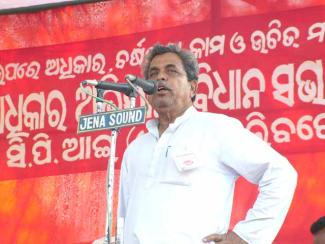With the demise of Comrade Kshitish Biswal we lost yet another veteran communist leader whose journey had begun in the final years of India's freedom movement. He was born on 5 May 1930 in Tipuri village of Puri district. The youngest of the three sons born to Brundaban Biswal and Rohini Devi, Kshitish Biswal grew up as a sensitive person caring for the common good of his village. In 1940-41 the village faced a severe cholera epidemic claiming as many as twenty-six lives including six people in the Biswal family. Young Kshitish experienced the vulnerability of common villagers and felt a deep urge for development and welfare of his fellow people. At the same time he also felt drawn to the growing waves of the freedom movement, especially the Quit India agitation of 1942.
But before the country could attain independence, Kshitish lost his father. His studies got disrupted and he had to get involved in his family's farming occupation. But after a brief period of interruption, he resumed his studies and took up a teaching job. He also served as a village level government worker for some time. In 1964 he quit this job and returned briefly to teaching before opting for a full-time career in communist politics. He had already joined the CPI in 1958 and after the formation of the CPI(M) in 1964 he joined the latter. His association with the CPI(M) ended in 1990 and he joined the Indian People's Front and CPI(ML). He served as the Secretary of the Odisha State Committee and also discharged his role as a member of the party Central Committee till the 9th Congress in Ranchi (2013).
All through his active political life, Comrade Khitish Biswal remained a revolutionary leader of the masses. He served as a highly popular sarpanch of Kanas Panchayat in Puri from 1966 to 1970. In subsequent years he emerged as a militant leader of land struggles and the movement for the rights of share-croppers and fisherfolks. In 1999 the fishing community of Chilika put up a heroic resistance to the Chilika privatisation bill and successfully defended their fishing rights and livelihood.
Comrade Kshitish Biswal will also be remembered for his unwavering commitment to communist ideology and spirited dedication to the organisation. Till being stopped by ill health and advancing age, he would everyday cycle his way from his Bhubaneshwar home to the party office near Bhubaneshwar railway station which grew as the Nagbhushan Bhawan under his caring supervision and leadership. Apart from serving as a centre for the Odisha party, Nagbhushan Bhawan became a popular venue for a whole range of democratic forces and initiatives in the city. It also served as a centre for all-India meetings and workshops of the party and several mass organisations.
The party will always cherish Comrade Kshitish Biswal's contributions to the cause of the communist movement in Odisha. The energy, spirit and care with which he built and led the party organisation in Odisha and its institutional headquarters, the Nagbhushan Bhawan, will remain an enduring example for the whole party. His legacy will continue to inspire communists in Odisha and beyond in today's anti-fascist resistance and advancing waves of people's struggles.









